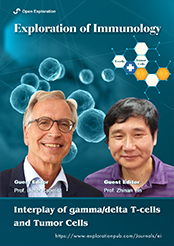-
Guest Editors
Dr. Dieter Kabelitz E-Mail
Director emeritus, Senior Research Group Leader, Institute of Immunology UKSH Campus Kiel / CAU, Kiel, Germany
Research Keywords: Functional plasticity of human γδ T cells, cell-based immunotherapy
Dr. Zhinan Yin E-Mail
The Biomedical Translational Research Institute, Faculty of Medical Science, Jinan University, Guangzhou, Guangdong, P.R. China
Research Keywords: γδ T cells, cancer, immunotherapy, neuroimmunology, immune regulation
About the Special Issue
In contrast to conventional aβ T cells, (most) γδ T cells are not MHC-restricted. γδ T cells recognize and kill malignant cells through the T-cell receptor and activating NK receptors like NKG2D which recognizes stress-inducible cell surface ligands. The human Vγ9Vδ2 γδ T-cell receptor recognizes small pyrophosphates in the context of butyrophilin molecules. Such pyrophosphates are overproduced by many transformed cells, which renders tumor cells susceptible to γδ T-cell killing. Due to their MHC-independence, γδ T cells can be applied in cellular immunotherapy also across HLA barriers. On the other hand, γδ T cells are also subject to inhibitory mechanisms of the tumor micromilieu.
In this Special Issue, we will publish cutting edge papers dealing with various aspects of how γδ T cells interact with tumor cells, including translational perspectives for improving the clinical application of γδ T cells in immunotherapy. Both original contributions as well as focused reviews are welcome.
Keywords: γδ T cells, tumor cells, NK receptors, tumor micromilieu, checkpoint inhibitors, butyrophilin, pyrophosphates, Vδ2 γδ T cells, Vδ1 γδ T cells
Call for Papers
Published Articles
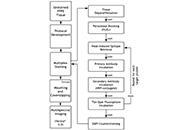 A multispectral immunohistochemistry panel to investigate γδ T cells and butyrophilin molecules in the tumour microenvironmentOpen AccessProtocolConventional immunohistochemistry methods though once fundamental for the individual staining of cell markers, have now been superseded by multispectral immunohistochemistry (mIHC). mIHC enables sim [...] Read more.Jessica Da Gama Duarte ... Andreas BehrenPublished: June 16, 2022 Explor Immunol. 2022;2:383–392
A multispectral immunohistochemistry panel to investigate γδ T cells and butyrophilin molecules in the tumour microenvironmentOpen AccessProtocolConventional immunohistochemistry methods though once fundamental for the individual staining of cell markers, have now been superseded by multispectral immunohistochemistry (mIHC). mIHC enables sim [...] Read more.Jessica Da Gama Duarte ... Andreas BehrenPublished: June 16, 2022 Explor Immunol. 2022;2:383–392
DOI: https://doi.org/10.37349/ei.2022.00057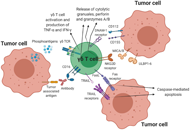 Allogeneic gamma delta T cells as adoptive cellular therapy for hematologic malignanciesOpen AccessReviewCancer immunotherapy, especially T-cell driven targeting, has significantly evolved and improved over the past decade, paving the way to treat previously refractory cancers. Hematologic malignancies [...] Read more.Navdeep Jhita, Sunil S. RaikarPublished: June 07, 2022 Explor Immunol. 2022;2:334–350
Allogeneic gamma delta T cells as adoptive cellular therapy for hematologic malignanciesOpen AccessReviewCancer immunotherapy, especially T-cell driven targeting, has significantly evolved and improved over the past decade, paving the way to treat previously refractory cancers. Hematologic malignancies [...] Read more.Navdeep Jhita, Sunil S. RaikarPublished: June 07, 2022 Explor Immunol. 2022;2:334–350
DOI: https://doi.org/10.37349/ei.2022.00054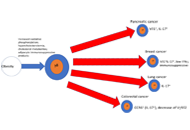 Obesity and cancer: the gammadelta T cell linkOpen AccessReviewObesity has become a worldwide scourge, affecting more than 10% of adults worldwide. While widely recognized to be associated with increased incidence of medical conditions such as diabe [...] Read more.Ilan BankPublished: May 31, 2022 Explor Immunol. 2022;2:320–333
Obesity and cancer: the gammadelta T cell linkOpen AccessReviewObesity has become a worldwide scourge, affecting more than 10% of adults worldwide. While widely recognized to be associated with increased incidence of medical conditions such as diabe [...] Read more.Ilan BankPublished: May 31, 2022 Explor Immunol. 2022;2:320–333
DOI: https://doi.org/10.37349/ei.2022.00053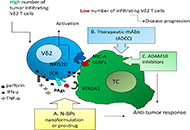 Anti-cancer γδ T lymphocytes: contradictory past and promising futureOpen AccessPerspectiveRecent anti-cancer strategies are based on the stimulation of anti-tumor immune reaction, exploiting distinct lymphocyte subsets. Among them, γδ T cells represent optimal anti-cancer candidates, especially in those tissues where [...] Read more.Alessandro Poggi, Maria Raffaella ZocchiPublished: April 28, 2022 Explor Immunol. 2022;2:220–228
Anti-cancer γδ T lymphocytes: contradictory past and promising futureOpen AccessPerspectiveRecent anti-cancer strategies are based on the stimulation of anti-tumor immune reaction, exploiting distinct lymphocyte subsets. Among them, γδ T cells represent optimal anti-cancer candidates, especially in those tissues where [...] Read more.Alessandro Poggi, Maria Raffaella ZocchiPublished: April 28, 2022 Explor Immunol. 2022;2:220–228
DOI: https://doi.org/10.37349/ei.2022.00047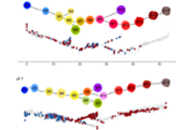 Single-cell differentiation trajectories define early stages of a human cutaneous T-cell lymphomaOpen AccessOriginal ArticleAim: The aim of this article is to characterize in detail the γδ T lymphocytes from an adult patient with primary cutaneous T-cell lymphoma of γδ s [...] Read more.Juan-Pablo Cerapio ... Jean-Jacques FourniePublished: April 15, 2022 Explor Immunol. 2022;2:185–199
Single-cell differentiation trajectories define early stages of a human cutaneous T-cell lymphomaOpen AccessOriginal ArticleAim: The aim of this article is to characterize in detail the γδ T lymphocytes from an adult patient with primary cutaneous T-cell lymphoma of γδ s [...] Read more.Juan-Pablo Cerapio ... Jean-Jacques FourniePublished: April 15, 2022 Explor Immunol. 2022;2:185–199
DOI: https://doi.org/10.37349/ei.2022.00044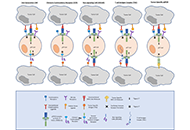 Augmenting human gamma delta lymphocytes for cancer therapy with chimeric antigen receptorsOpen AccessReviewGamma delta lymphocytes (γδ T) sit at the interface between innate and adaptive immunity. They have the capacity to recognize cancer cells by interaction of their surface receptors with an array of cancer cell surface target ant [...] Read more.Gabrielle M. Ferry, John AndersonPublished: March 17, 2022 Explor Immunol. 2022;2:168–179
Augmenting human gamma delta lymphocytes for cancer therapy with chimeric antigen receptorsOpen AccessReviewGamma delta lymphocytes (γδ T) sit at the interface between innate and adaptive immunity. They have the capacity to recognize cancer cells by interaction of their surface receptors with an array of cancer cell surface target ant [...] Read more.Gabrielle M. Ferry, John AndersonPublished: March 17, 2022 Explor Immunol. 2022;2:168–179
DOI: https://doi.org/10.37349/ei.2022.00042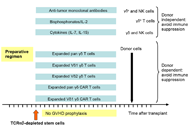 The role of γδ T cells in the context of allogeneic stem cell transplantationOpen AccessReviewAllogeneic stem cell transplantation is currently the only curative approach for a variety of malignant and non-malignant diseases. In the early transplant era, the intent of this treatment was to a [...] Read more.Rupert Handgretinger ... Manon QueudevillePublished: March 16, 2022 Explor Immunol. 2022;2:157–167
The role of γδ T cells in the context of allogeneic stem cell transplantationOpen AccessReviewAllogeneic stem cell transplantation is currently the only curative approach for a variety of malignant and non-malignant diseases. In the early transplant era, the intent of this treatment was to a [...] Read more.Rupert Handgretinger ... Manon QueudevillePublished: March 16, 2022 Explor Immunol. 2022;2:157–167
DOI: https://doi.org/10.37349/ei.2022.00041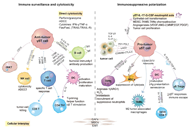 Novel insights based on the plasticity of γδ T cells in the tumor microenvironmentOpen AccessReviewγδ T cells express unique T cell receptor (TCR) γ and TCR δ chains, with structural and functional heterogeneity. Taking advantage of the diverse γδ TCR repertoire or other ligand-receptor interactions, γδ T cells can reco [...] Read more.Yue Wang ... Wei HePublished: February 24, 2022 Explor Immunol. 2022;2:98–132
Novel insights based on the plasticity of γδ T cells in the tumor microenvironmentOpen AccessReviewγδ T cells express unique T cell receptor (TCR) γ and TCR δ chains, with structural and functional heterogeneity. Taking advantage of the diverse γδ TCR repertoire or other ligand-receptor interactions, γδ T cells can reco [...] Read more.Yue Wang ... Wei HePublished: February 24, 2022 Explor Immunol. 2022;2:98–132
DOI: https://doi.org/10.37349/ei.2022.00039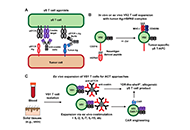 γδ T cell costimulatory ligands in antitumor immunityOpen AccessReviewAntitumor immunity relies on the ability of T cells to recognize and kill tumor targets. γδ T cells are a specialized subset of T cells that predominantly localizes to non-ly [...] Read more.Joseph M. McGraw, Deborah A. WitherdenPublished: February 24, 2022 Explor Immunol. 2022;2:79–97
γδ T cell costimulatory ligands in antitumor immunityOpen AccessReviewAntitumor immunity relies on the ability of T cells to recognize and kill tumor targets. γδ T cells are a specialized subset of T cells that predominantly localizes to non-ly [...] Read more.Joseph M. McGraw, Deborah A. WitherdenPublished: February 24, 2022 Explor Immunol. 2022;2:79–97
DOI: https://doi.org/10.37349/ei.2022.00038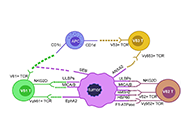 Tumor-associated protein ligands recognized by human γδ T cell receptor and their implications in cancer therapyOpen AccessReviewIn recent years, immunologists have been working to utilize the functional mechanism of the immune system to research new tumor treatment methods and achieved a major breakthrough in 2013, which was [...] Read more.Chang Liu ... Wei HePublished: February 22, 2022 Explor Immunol. 2022;2:64–78
Tumor-associated protein ligands recognized by human γδ T cell receptor and their implications in cancer therapyOpen AccessReviewIn recent years, immunologists have been working to utilize the functional mechanism of the immune system to research new tumor treatment methods and achieved a major breakthrough in 2013, which was [...] Read more.Chang Liu ... Wei HePublished: February 22, 2022 Explor Immunol. 2022;2:64–78
DOI: https://doi.org/10.37349/ei.2022.00037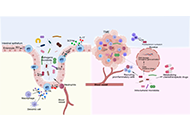 The microbiota is a potential mediator of the crosstalk between γδ T cells and tumorsOpen AccessReviewγδ T cells are one of the immune cell types that express antigen receptors. γδ T cells are able to recognize pathogens or cancer cells independently o [...] Read more.Huidi Wang ... Jia YinPublished: February 18, 2022 Explor Immunol. 2022;2:48–63
The microbiota is a potential mediator of the crosstalk between γδ T cells and tumorsOpen AccessReviewγδ T cells are one of the immune cell types that express antigen receptors. γδ T cells are able to recognize pathogens or cancer cells independently o [...] Read more.Huidi Wang ... Jia YinPublished: February 18, 2022 Explor Immunol. 2022;2:48–63
DOI: https://doi.org/10.37349/ei.2022.00036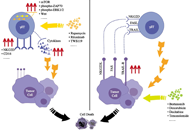 γδT cells: alternative treasure in antitumor immunityOpen AccessReviewIn recent decades, abundant methods for targeted tumor cell immunotherapy have been developed. It was recently discovered that excellent curative effects observed in hematological tumors cannot be achieved in solid tumors, as seri [...] Read more.Xiangjin Zhang ... Wei HePublished: February 17, 2022 Explor Immunol. 2022;2:32–47
γδT cells: alternative treasure in antitumor immunityOpen AccessReviewIn recent decades, abundant methods for targeted tumor cell immunotherapy have been developed. It was recently discovered that excellent curative effects observed in hematological tumors cannot be achieved in solid tumors, as seri [...] Read more.Xiangjin Zhang ... Wei HePublished: February 17, 2022 Explor Immunol. 2022;2:32–47
DOI: https://doi.org/10.37349/ei.2022.00035 -
-
Ongoing Special Issues
-
Completed Special Issues
